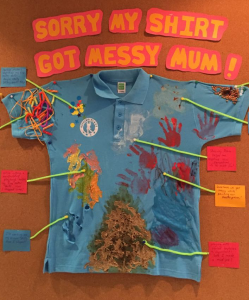 If you have visited us in Shanghai recently you may have noticed a very ‘messy’ blue shirt proudly displayed on the wall in the reception area. This blue shirt acts as a reminder to us all about the benefits of those tell tale signs of ‘messy play.’
If you have visited us in Shanghai recently you may have noticed a very ‘messy’ blue shirt proudly displayed on the wall in the reception area. This blue shirt acts as a reminder to us all about the benefits of those tell tale signs of ‘messy play.’
Why is Messy Play Important?
Messy Play is an important part of early education. If offers many opportunities for learning. In designing a stimulating program for young children, it is crucial to foster growth in all areas of development.
Physical Development
Messy play gives children the tools to develop and practice fine motor skills and eye hand coordination. Activities such as stacking, pouring, and spooning develop eye-hand coordination. Practicing cutting, writing in shaving cream, and using tongs develop fine motor skills. Hands-on activities provide opportunities for children to compare textures such as smooth, rough, hard, and soft. While respecting each other’s personal space, children will gain an understanding of their own body space.
Communication and Language Development
During messy play, children have opportunities to speak and listen. They use words and gestures to share resources, explain actions, negotiate plans, and take turns. Teacher and caregiver will ask open ended questions to encourage thinking skills. The use of letters in the activities leads to understanding the symbolic nature of written language.
Personal, Emotional and Social Development
Messy Play is designed with children’s natural curiosity in mind. It encourages a positive approach to new experiences. There is no “right” way for children to do messy play. This builds self-confidence and self-esteem. Through messy play, children can develop concentration, problem-solving, and planning. Working with others fosters self-respect and respect for others. It also presents opportunities for making relationships. Messy play can offer an outlet for feelings, experiences, and thoughts.
Intellectual Development
Children will investigate, explore, design, and create, leading to a better understanding of the world around them. Children will learn to group and classify, arrange items in a logical order, identify and match, and understand cause and effect. As they observe, predict, try out solutions, observe the results, and evaluate information they gain a greater understanding of the scientific method.
Mathematical Development
Messy play offers many opportunities for counting, calculating, and measurement. The children will sort objects, fill containers, and create patterns. Numbers are involved in many activities, providing opportunities to understand their symbolic meaning.
Creative Development
Children are given endless opportunities with a variety of materials to build imagination and creativity. Through sensory experiences, they are able to respond to what they see, hear, feel, touch and smell. They will express their feelings and thoughts through color, texture, shapes, and forms in two and three dimensions.
Special Benefits
Messy play offers benefits to all children. It allows children of all abilities to become involved and get to know other children. Children who are in the process of developing early language skills can join in and use the materials with their peers because messy play does not rely on words. Since there is no “right way” to do messy play, children with special needs can use these open-ended materials in their own way and still be a part of the group.




